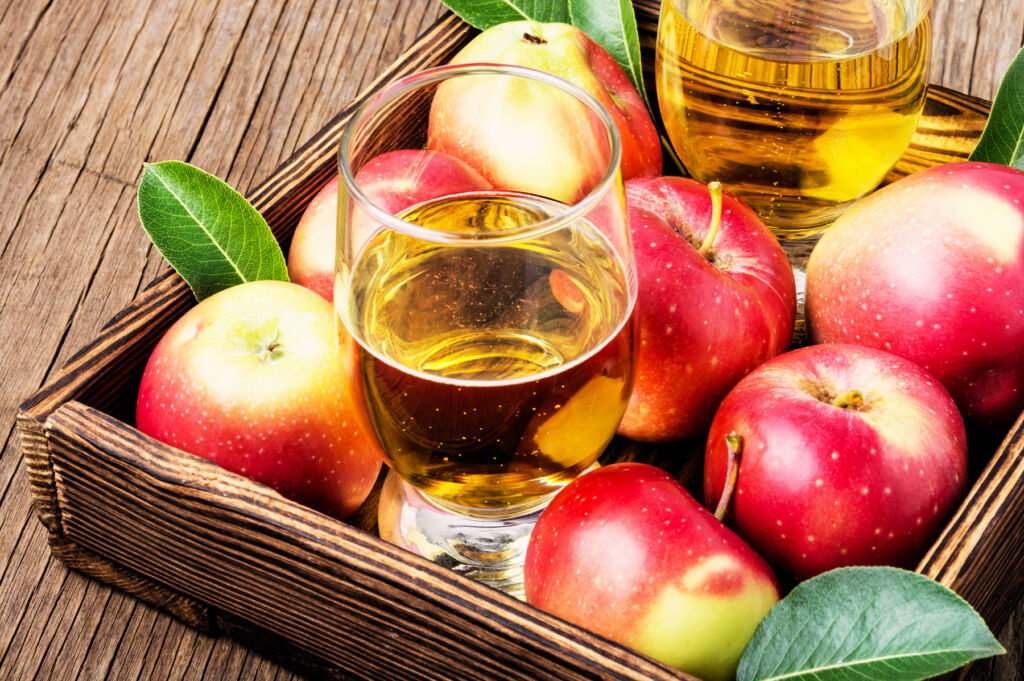
Cider is often associated with festivals and youths, but did you know that ciders are made just like wines? Alistair Morrell of Cider is Wine is asking drinkers, particularly wine drinkers, to take a new look at ciders, perries and fruit wines to discover what are sophisticated, elegant and delicious drinks.
Luxurious Magazine: Tell us how did you become so passionate about cider?
Alistair Morrell: Like many, my youthful experience of cider was not that rewarding, if you get my drift. My attitude continued to be coloured by over 30 years of working in the wine business. Yet, some five years ago, I was approached by a cidermaker to provide some marketing support and, on tasting his product, I realised I had to change my attitude not only to cider but also to wine.
What I tasted was, to all intents and purposes, ‘wine’, except it was made from apples: fermented once a year and redolent of what (grape) winemakers call ‘terroir’, so reflecting provenance and the skill and passion of the maker. It was clear to me that I needed to re-learn what cider was all about and who else was making products that tasted so wonderful. I also needed to understand why there appeared to be so little trade and consumer knowledge, so I embarked on a new drinks journey.
It was clear that such makers were operating very much under the radar. I felt that, as a consumer, it could be argued that we were being short-changed by mass-market cider manufacturers, most of whom are producing a homogenised drink where 65% of the content is reconstituted and added to (water, sweeteners, colourings and flavourings).
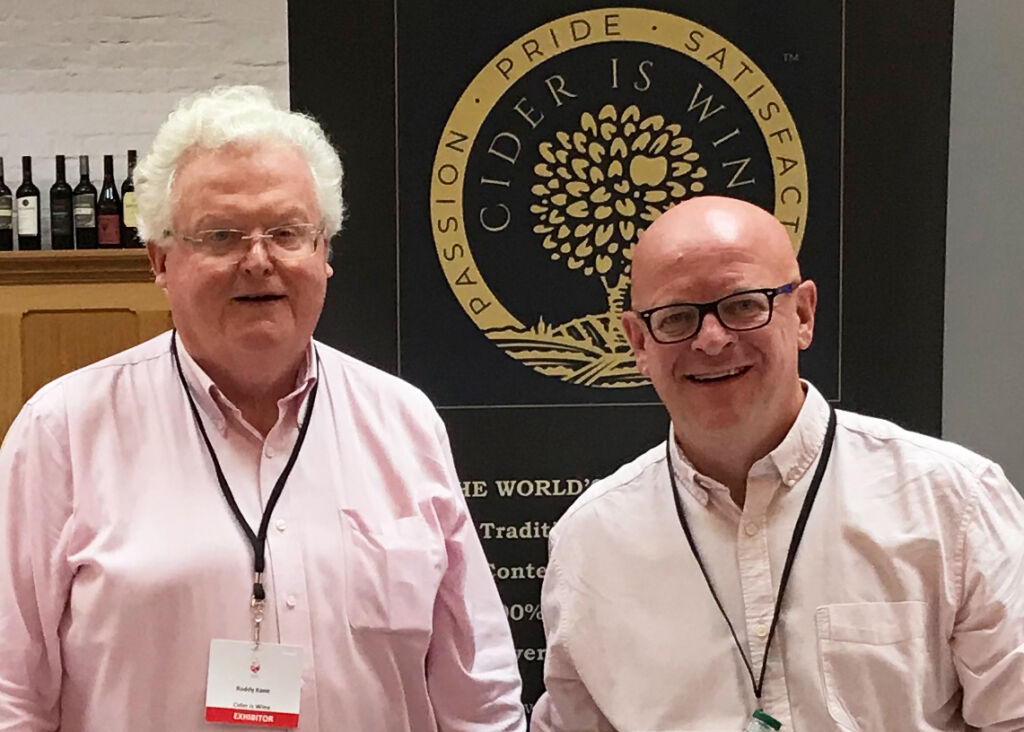 Roddy Kane, Chief Cider Marketing Officer and Alistair Morrell, Founder & Chief Cider Officer.
Roddy Kane, Chief Cider Marketing Officer and Alistair Morrell, Founder & Chief Cider Officer.
My discoveries turned that interest into a passion, which became Cider Is Wine, a category champion for 100% fresh juice, not-from-concentrate ciders, perries and fruit wines. They are drinks produced, not manufactured – providing a voice for artisan producers under a marketing and sales umbrella designed to inform and educate both the trade and consumers about the existence – and availability – of these fine products that always surprise and delight.
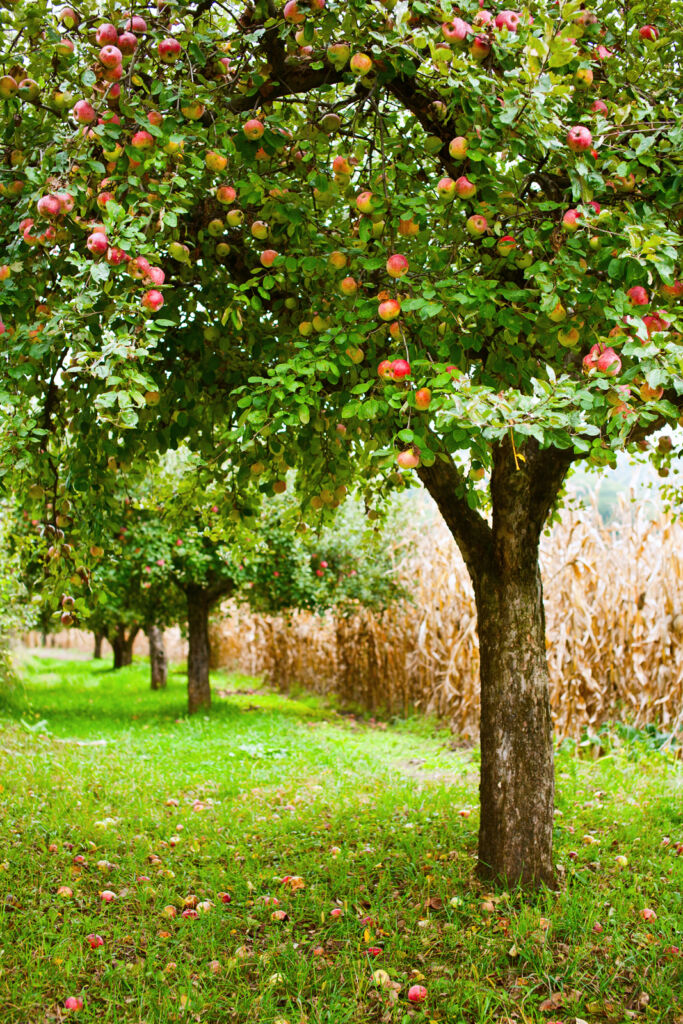
LM: In a world where wines and beers seem to dominate, how does cider fair among this?
Alistair: Mass market cider producers have aimed their marketing at beer drinkers and gone for the volume that the beer market represents. As alcohol consumption has reduced over the last 20 years, demand for cider has followed suit.
Cider has effectively ended up as a cheap alcohol alternative and is, today, the sector with the lowest (quality) perception of the beers, wines, spirits and cider industry.
For the manufacturers, the tightest margins mean an industry in structural decline. The industry’s figures (source: National Association of Cidermakers) show that the overall market has declined by 30% in volume terms and 28% in value over the last ten years.
I hasten to add that the quality end of the industry, in which I include the 100% juice, not-from-concentrate producers, has bucked this downward trend, accelerated by the pandemic, reflecting the growing consumer desire to drink less but better.
There are an estimated 2,000 producers of cider in the UK, most of which produce less than 7,000 litres, so barely more than for personal consumption. In the USA, cider is the second-fastest-growing alcoholic drink, and in Eastern Europe, it is a popular high-end artisan beverage.
LM: Cider is Wine – not only the name of the company but also a statement. How is that so?
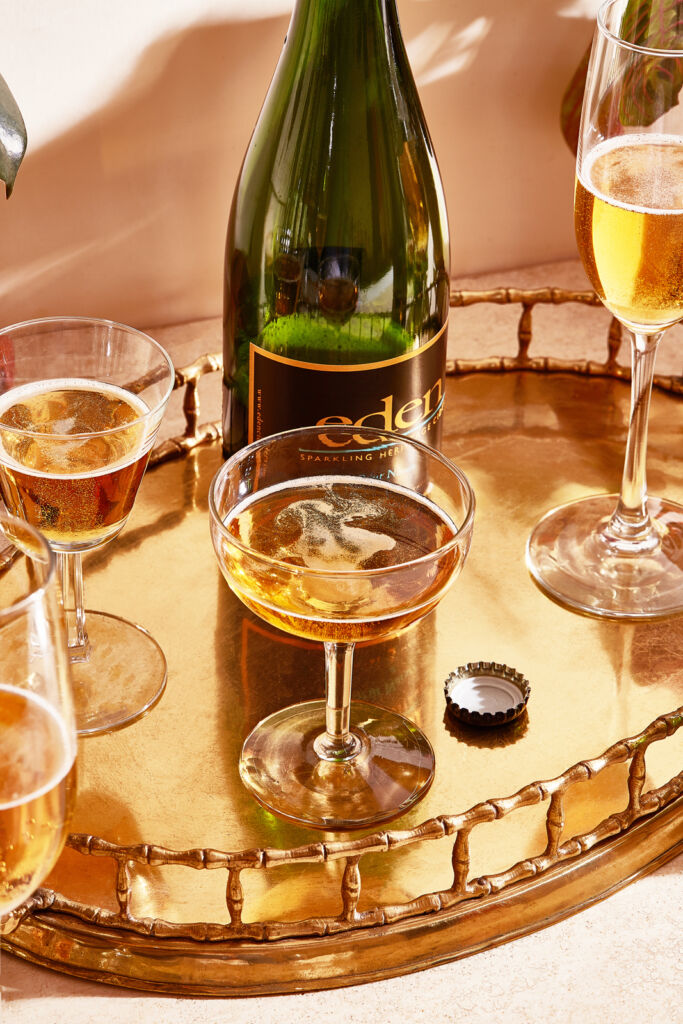 Alistair: Let’s be clear, cider is cider, but it can also quite rightly be called wine when it’s fermented from 100% fresh juice without the use of concentrates, essentially following EU – and globally accepted – grape winemaking law.
Alistair: Let’s be clear, cider is cider, but it can also quite rightly be called wine when it’s fermented from 100% fresh juice without the use of concentrates, essentially following EU – and globally accepted – grape winemaking law.
The point is that there is no globally accepted standard for ciders, perries and fruit wines: in the UK you can call a drink ‘cider’ or ‘perry’ if it contains just 35% juice, all of which can be from concentrate; in other countries, it can be even less.
Yet there are makers out there who follow EU grape winemaking rules and regulations and produce ciders, perries and fruit wines that are as varied as wines made from grapes and that are just as redolent of provenance and ‘terroir’.
Put simply, Cider Is Wine is a clear and unequivocal statement that consumers can have confidence that the product is fermented from 100% fresh juice without the addition of any concentrates.
LM: Let’s talk about the wine that’s made from various fruits. How do they qualify as wine, and what is the cider making process?
Alistair: The dictionary definition of ‘wine’ is “an alcoholic drink produced by the fermentation of grapes… an alcoholic drink produced in this way from other fruits, flowers, etc.” (Collins Concise Dictionary, 21st Century Edition). Unlike beer, which is brewed, and spirits created through distillation, wines and ciders are fermented. Our producers also make their products once a year (unlike the continuous manufacturing process of the mass market).
So fruit wines are just that, harvested fruit fermented, without the addition of concentrates or syrups, into delicious drinks, which vary according to each vintage (or year).
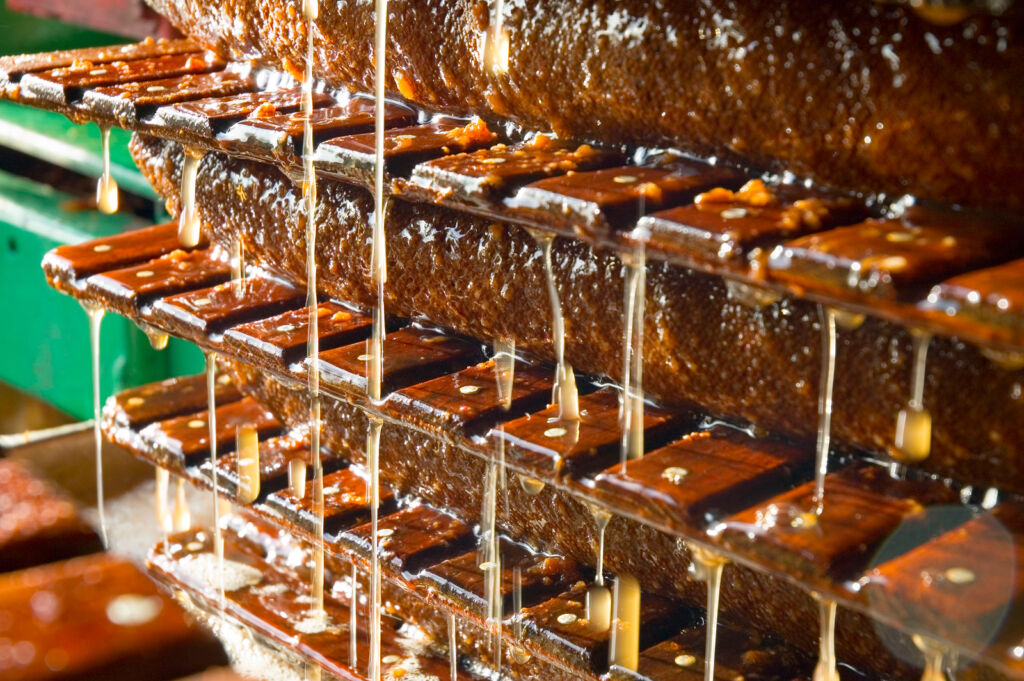
LM: How do you go about choosing a supplier? Do they need to meet set criteria?
Alistair: Firstly, they must guarantee – in writing – that they produce their ciders, perries and fruit wines from 100% fresh juice without the use of any concentrates and essentially follow (EU) winemaking rules and regulations. We then taste each and every product, as we have spent our careers doing with wines made from grapes, to ascertain its characteristics and assure ourselves that it’s free of any winemaking faults.
Personal taste is not a criterion. We then look at price points and the consistency of production and supply. Quite simply, they have to be delicious, and we have turned a small number away!
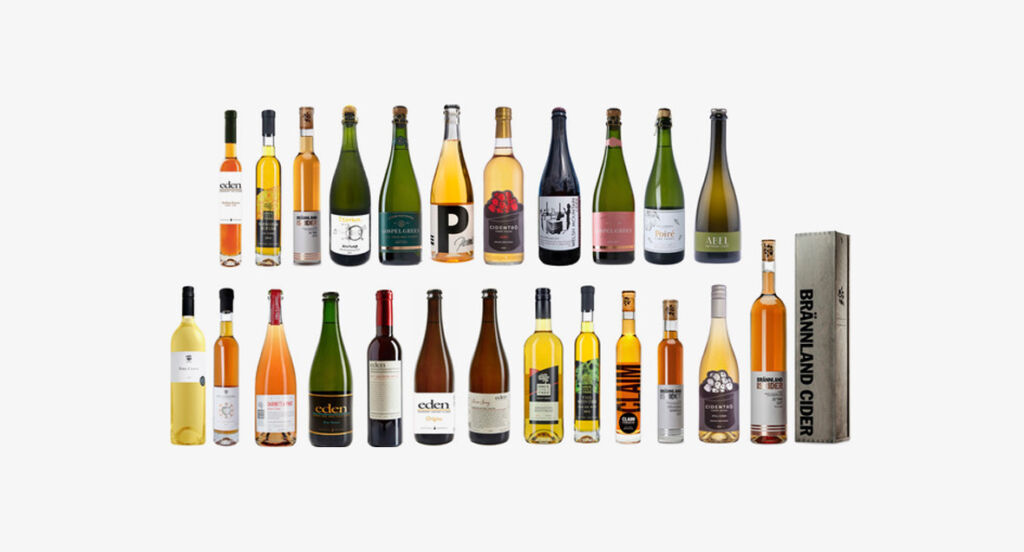
LM: What sorts of styles are available? Is there something for every palette?
Alistair: The products we sell range from sparkling to still, from light golden to amber (pink too), and from Champagne-style Brut to unctuously sweet, and every point in-between. Unlike most wines, ciders also feature umami, with sourness and sweetness, which give them more balancing aspects on the palate, so can match the aromatics, spice and sweet and sour of many Asian cuisines better than wines – experience tells me that there’s a cider to suit every palate and every occasion.
LM: People are far more conscious of how much alcohol they consume. Cider is lower in alcohol, is it not?
Alistair: On average, ciders and perries naturally contain roughly half the alcohol of wine: our range runs from as little as 3% to 13% (for a stunning ice cider), but the vast majority are around the 7-8% mark. Our fruit wines are all lower in alcohol than grape wines, too. It’s worth saying that all ciders and perries are gluten-free, and the vast majority (I can think of only one exception in our whole range) are vegetarian and vegan friendly.
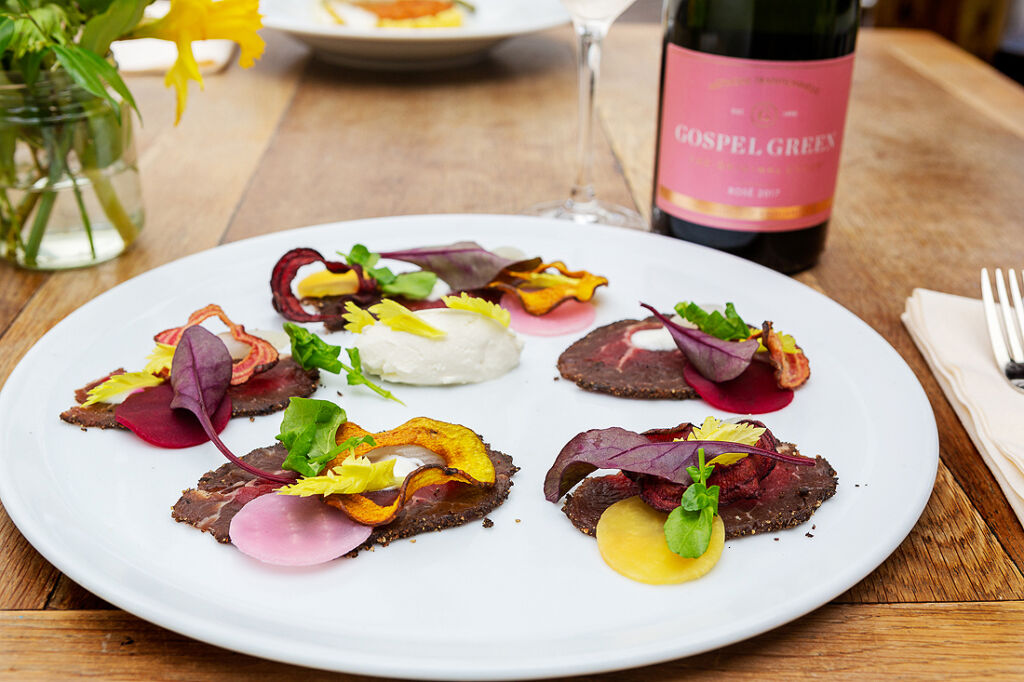
LM: With Christmas coming up, what foods pair well with cider?
Alistair: Maybe it is better to ask which don’t pair with foods. There is a good case to make that ciders and perries pair with food better than (grape) wines. All ciders and perries have tannin and higher acidity than wines; when produced well and in balance with the natural fruit and fruit sweetness, then they can pair with any food.
Here are some suggestions from the Cider Is Wine range:
Aperitifs & canapes
Tinston Anatomy 2017 – made like champagne, this bottle aged cider is the perfect alternative to champagne or prosecco. The crisp, lively fruit, wonderful fresh balancing acidity and subtle green apple freshness are delightful and make a great start to any occasion.
Smoked Salmon – A Christmas Classic
Berrylands Rhubarb Melomel 2019 – Smoked salmon is both subtle and yet assertive and has a strong flavour, so we have chosen something quite different and yet a perfect match – Berrylands Rhubarb Melomel. Rhubarb is often served as part of the dish with smoked salmon, valued for its tartness, so why not in a drink?
This totally natural Rhubarb ferment from Ukraine is fermented with local natural sourced honey, thus making this a melomel, somewhere between mead & wine. Dry and demonstrating the natural tartness of the rhubarb, this balanced drink is a perfect match for the Christmas classic.
Turkey & All the trimmings
Once Upon A Tree Cabernet Co-Ferment 2019 – Red or white is often the discussion in our house about which goes best with turkey, so let’s sidestep the discussion with a wonderful drink that is both red and white. This wonderful umami filled cider is fermented on cabernet skins to give a wonderful ‘curranty’ sense and yet has a core (pun intended) of the firm apple tannin and acidity, wrapped up with some fleshiness of the apple. This cider is a wonderful argument-dampening pairing for Christmas.
Christmas Pudding
Brannland IsCider – Made in the cold of northern Sweden, the juice for this has been left outside over winter to freeze and create intensely sweet juice that is then fermented. It creates this ice-cider. A wonderful golden colour, rich in texture in the glass, rich, ripe fruit of passionfruit and fig on the nose, its palate is sensational. Sweet, laden with fruit flavours, all generated naturally from the apple, alongside balancing crisp acidity. Yes, this is the same sweetness as any dessert wine, but it critically has double the acidity, which balances beautifully.
Cider is Wine – Where and How?
For more information on Cider is Wine and to enrol on an online tasting session, visit www.cideriswine.co.uk.
Read more exclusive interviews here.
![]()


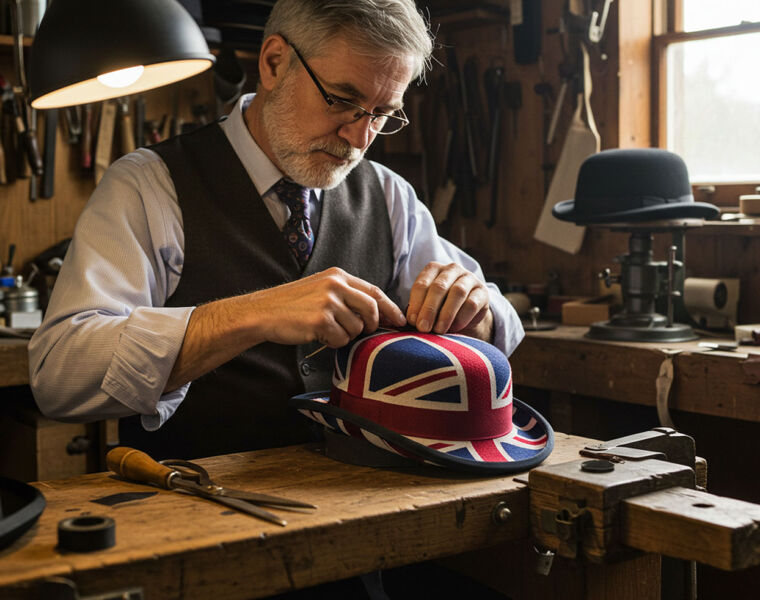

You must be logged in to post a comment.